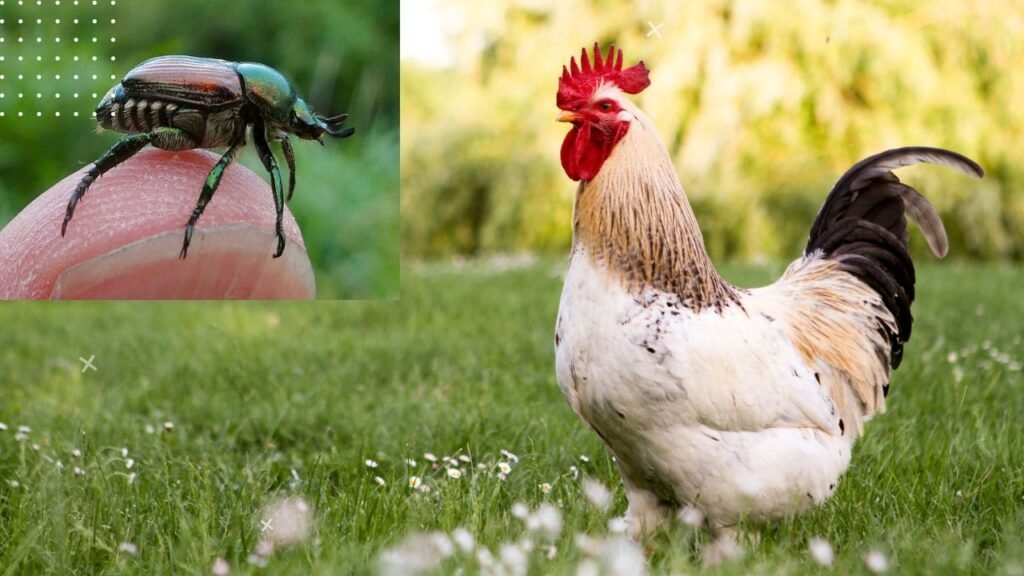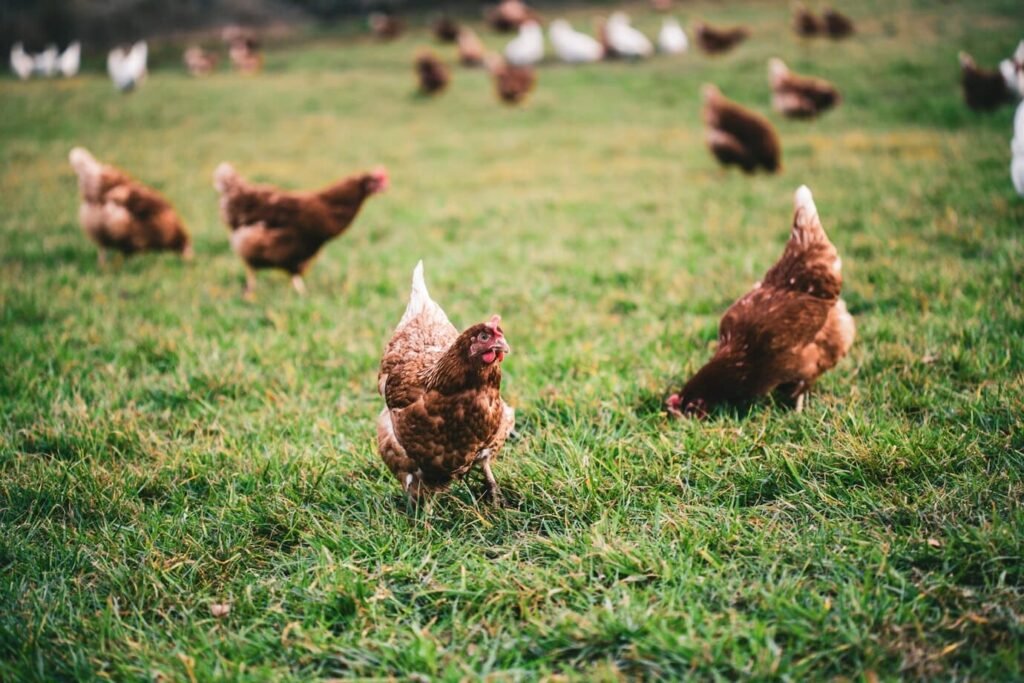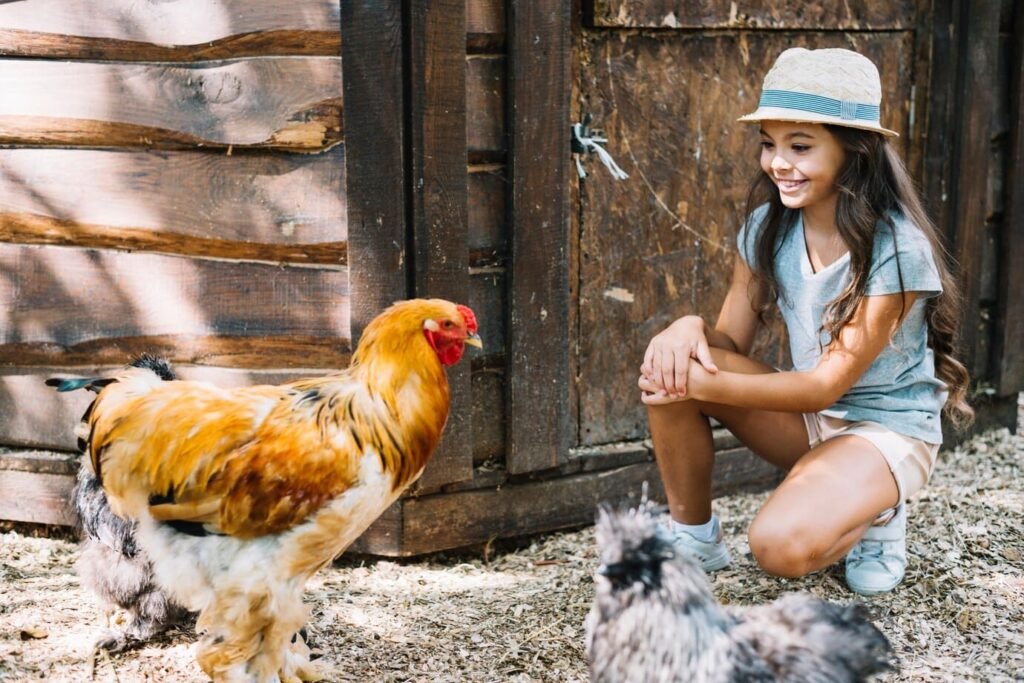


It started with just a few sightings of the metallic green menaces swarming my prized rosebushes. But soon, I faced a full-scale invasion with swarms of Japanese beetles skeletonizing leaves and decimating flowers across my backyard garden. These determined pests seemed impossible to thwart using typical pesticide sprays and physical removal attempts.
In my desperation, I wondered— could letting loose my neighbor’s chickens in my garden potentially help curb these aggressive invaders? Do Chickens Eat Japanese Beetles?
Well, I eventually discovered that chickens possess shockingly voracious appetites for insects, making them Mother Nature’s perfect little exterminators. And they gobbled up Japanese beetles by the dozens!
If your landscape also faces a takeover from these terrorizing pests, recruiting a feathered clean-up crew may offer the natural solution you seek.
Keep reading to learn all about the shocking pest-hunting capabilities of chickens when it comes to eliminating Japanese beetles. We’ll cover:
Let’s first understand why Japanese beetles warrant so much consternation from gardeners and farmers in the first place.
Japanese beetles constitute invasive pests originating from Japan, but have spread pervasively across the eastern United States and Canada since first arriving in 1916.
These metallic green beetles measure around 1⁄2 inch long as adults, with signature iridescent copper-brown wing covers. They emerges en masse during summer months to lay eggs, attack plants, and create extensive issues:
If allowed to breed unencumbered, dense Japanese beetle swarms completely defoliate trees, shrubs, and garden plants with frightening efficiency.
But one unlikely natural ally happily helps halt their booming bands—behold the chicken!
As omnivores always investigating their surroundings, chickens eagerly eat most any small insects they discover roaming through their environment.
When allowed to range freely, chickens utilize their beaks to probe soil and leaf litter seeking below-surface insects like grubs. They then scratch away materials and gobble down pests with gusto. Above ground, they snatch fluttering bugs right out of the air.
Their menus know no bounds!
When it comes to those beautiful but dastardly Japanese beetles, chickens view their metallic bodies as perfect little protein snacks. Backyard chickens kept for egg laying require frequent high protein intake. This means beetles and other bugs provide cost-free feed supplementing commercial layer feeds.
In fact, one University of Georgia study found a small flock of only 60 free-ranging hens managed to slurp up an average of 63,000 highly destructive southern masked chafer beetle larvae over 4 months! That severely cut down these pests’ future adult emergence.

So how voraciously might chickens battle notoriously ravaging Japanese beetles upon release into your garden landscape? Brace yourself for some staggering potential consumption estimates:
The quantity of insects and pests chickens eat expands exponentially the more free range they receive. While confined chickens access more limited ground coverage, unleashed birds cover substantial territory probing the landscape.
Backyard chickens typically consume up to 20% of their body weight daily when allowed to graze fields. A 5-pound hen might devour 1 pound of insects in a single day. Over half her diet could encompass various pest bugs, worms, snails and more wandering her surroundings.
Let’s assume the average summer Japanese beetle weighs around 0.02 ounces (or .63 grams). This means that same average 5-pound chicken could potentially gobble roughly:
500+ Japanese beetles per day
Expanding this slaughter capacity across just a mini backyard flock manifests simply astonishing predation potential against beetle broods!
For illustrative purposes, here’s what a small contingent of five mature hens might accomplish in your garden landscape over one summer season lasting 90 days:
And that doesn’t even factor in the number of grubs chickens dig up out of curiosity eliminating next season’s beetle larvae! Still want more proof poultry packs major pest punch? Keep reading!
The key to utilizing chickens as four-legged Japanese beetle exterminators involves allowing them access to infested areas during times of peak activity.
Adult Japanese beetles emerge to spawn each year starting in late May and June, reaching dense proposed populations through July into August. They congregate on plants in swarming clusters making meals easy for chickens to swoop upon.
Gardeners and small farm owners should consider:
As chickens scratch through plots, they interrupt larval life stages in soil while eliminating existing adults—a two-pronged population assault!
But wait, there’s more! Beyond amazing Japanese beetle destruction, chickens offer multiple bonuses as pest patrol.

Releasing chickens as garden guardians presents multiple advantages beyond beetle damage control:
Eliminate Other Garden Pests
Free-roaming chickens hunt all varieties of insects like cucumber beetles, tomato hornworms, asparagus beetles, squash bugs and borers. They also devour snails, slugs and small rodents. Just don’t expect chickens to handle large garden pests like woodchucks and deer!
Reduce Weed Growth
Along with pest removal, chicken scratching and pecking helps decrease weed seed spread. Their bathing in loose soil also exposes hidden weed seedlings to drying conditions.
Improve Soil Fertility
As chickens patrol plots, their waste droppings infuse nitrogen, phosphorus and potassium enriching soils for healthier plants. Just avoid direct manure contact with edibles!
Decrease Crop Disease
With fewer pest damages providing fungal/bacterial entry points, crops experience less blight and rot introducing pathogens.
Install for Free
Chickens require no diesel, electricity or installation. Simply add birds! Initial coop, care and feeding costs still apply.
Continue Laying Eggs
Egg production pauses during molting season. But otherwise hens lay while patrolling properties. Collect bonus eggs!
Reduce Landfill Waste
Chickens recycle household food scraps and garden vegetation waste into manure. Less gets tossed as garbage.
Now piece it all together:
…and that’s just the beginning! Still not convinced chickens offer the ultimate chemical-free pest control solution?
Maybe you require even more testimony directly from agricultural researchers themselves on just how staggeringly effective chicken patrols can prove for managing notorious crop hazards like Japanese beetles. Read on!
Multiple published studies confirm chickens possess unrivaled insect extermination efficacy in home and farm garden settings:
Across published literature, pastured poultry repeatedly controlled notorious crop hazards matching or besting standard pesticide applications. Yet chickens offer chemical-free pest purge without residues or environmental impact.
Still need convincing on commissioning chicken forces against Japanese beetle brigades threatening your garden landscape? Then let’s cover some tips for putting this pest control plan into action!
While simply flinging open the hen house door presents one approach, more caretaken strategy helps maximize pest management efficacy. Here are some recommendations when enlisting egg layers as insect executioners:
Choose More Active Foraging Chicken Breeds
Flighty, skittish breeds like Leghorns cover more ground while slower moving chickens focus foraging closer. Opt for active hunters!
Prepare a Designated Patrol Pen
Construct a bottomless floor enclosure using chicken wire over framing with an attached coop for overnight roosting security. Move this pen through insect infected areas allowing chickens pest purge access without destroying wanted vegetation.
Account for Space and Feed Needs
Each full sized chicken requires 4+ square feet of space plus ~1/4 pound of feed daily + abundant cool water. Scale up provisions accordingly per bird numbers and grazing time spans. Consider feed supplements like oyster shell.
Guard Against Predators
While out patrolling, chickens fall prey more easily to aerial and ground hunters. Use protective gazing, netting and wire fencing securing them in the pen at night away from hungry wanderers.
As long as chickens receive adequate care and responsibility, enlisting their pest hunting prowess through deployed regimens offers homeowners and growers immense service curtailing seasonal insect attacks. Reward their amazing assistance by collecting and enjoying the fresh eggs they’ll continue producing daily!
If your property continually falls victim to invasive pests like notorious Japanese beetles, deputize dependable new allies. Allow small squads of chickens access to infected areas under managed rotations.
Then watch your new feathered forces gobble garden invaders with shocking speed and efficacy while simultaneously boosting soil nutrition and overall plant vigor. Minus worrying about pesticide handling and drift!
Employ the strategic guidance covered here when drafting determined chicken troops against marauding beetles, caterpillars, grubs and other garden pest invaders. Your flowering fruits, vegetables and landscape will thank you for enlisting Mother Nature’s ready-made clean-up crew: the amazing pest-patrolling chicken!
Now that you know the incredible insectivore truth about chickens happily gobbling damaging Japanese beetles, will YOU consider marshaling a clucking cleanup corp through your own garden grounds this summer? Let your bird allies take a crack at restoring balance and order so everyone can thrive!
How many Japanese beetles can a single chicken eat per day?
Research shows one average 5-pound chicken can eat about 500 Japanese beetles daily, eliminating up to 225,000 over an entire summer. The more free range they have, the more they forage and consume.
Can chickens eliminate other insect pests besides Japanese beetles?
Yes! Chickens also handily consume cucumber beetles, squash bugs, cabbage worms, tomato hornworms, asparagus beetles, and more plant pests while also reducing slugs.
Are Japanese beetles safe for chickens to eat?
Yes, Japanese beetles are safe for chicken consumption, providing helpful protein. Just don’t allow chickens to gorge all at once risking overconsumption issues. Monitor grazing.
What are the best chicken breeds for insect pest control?
Active foraging chicken breeds like Rhode Island Reds, Buff Orpingtons, Barred Rocks, and Leghorns cover more ground hunting pests. Calmer breeds focus smaller areas.
Will chickens destroy my garden vegetation and plants?
Properly managed chickens mainly eliminate pests between plant rows. Using bottomless enclosures lets waste fertilize the soil without allowing access to eat crops.